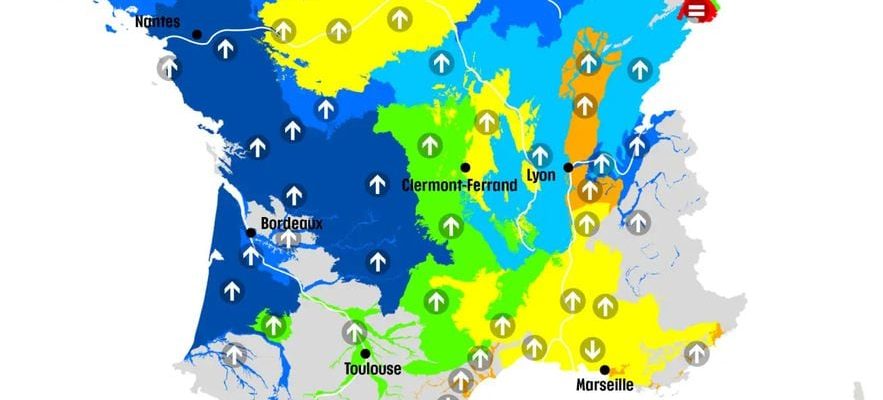The very heavy rainfall in October and especially November will ultimately have had a positive effect. The water supply to groundwater in mainland France improved “notably” on December 1, the Bureau of Geological and Mining Research (BRGM) announced this Thursday.
The French national geological service indicates in its monthly newsletter that almost half (48%) of the tablecloths have risen above seasonal norms, while only 14% did so on November 1st. On the other hand, 41% of water tables remain below normal on December 1st – compared to 65% a month earlier. The progression is worth highlighting.
Nearly half of the water tables (48%) rose above seasonal norms on December 1st, while only 14% did so on November 1st.
© / @BRMG
Much better than in 2022
The situation is notably much better than a year ago, when at the same time 70% of groundwater levels were below normal. “Only the aquifers of Languedoc and Roussillon”, where the rains remain insufficient to compensate for the deficits accumulated since 2022, “retain lower levels than in 2022”, notes the BRGM.
Despite everything, the situation remains very contrasted at the end of November, depending on the level of rain that fell but also on the nature of the water tables (reactive, either reacting quickly to bad weather, or inertial, little affected by climatic conditions). “The levels are very favorable on the reactive aquifers in the northern two-thirds”, where the levels are even “very high”, and in the south-west. But they remain “below normal for the aquifers of Corsica, the Mediterranean rim, the Limagne plain, the Rhône-Saône corridor, the south of Alsace and the Paris Basin”, notes the BRGM.
Significant precipitation
This overall improvement in the state of the soil is largely due to the record rainfall that fell in November, causing flooding and much damage, particularly in the north of France, but which also made it possible to recharge a certain number of tablecloths.
On November 18, Météo-France announced that between mid-October and mid-November, unprecedented amounts of precipitation had been recorded in the metropolis, caused by a “rail of depressions” over the Atlantic. In 30 days, the country was irrigated by an average cumulative rainfall of 237.3 mm. The previous record was 187.1 mm between January 13 and February 11, 1988. Only the Mediterranean rim or the northeast of Corsica were spared.
Uneven refills
Result: 78% of metropolitan water tables were up on December 1, compared to 12% in October. And recharge, which allows underground water reservoirs to replenish their stocks during the fall and winter, when vegetation is dormant, has become widespread. The latter, which usually starts in September-October, was delayed this year due to insufficient rains and vegetation remaining active due to high temperatures during the beginning of autumn.
Concerning forecasts for next year, the BRGM remains cautious for the moment. If for certain aquifers, an optimistic scenario can emerge if the rains continue to fall, for others, inertial (Artois, Paris basin, Rhône-Saône corridor) or very degraded (Roussillon), the reconstitution of water reserves appears ” difficult to envisage by spring 2024″, indicates the BRGM. The prospect of another dry summer could once again put soil water reserves in great difficulty.
